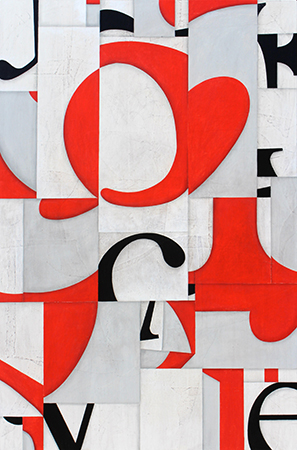Languaging and Emergent Scapes of the Intelligible: Thinking through an Experiment in Affective Mapping
DOI:
https://doi.org/10.25071/1925-5624.40335Palavras-chave:
linguajamento, difração, afeto, tradução, ecolinguísticaResumo
O que significaria explorar questões de tradução e diversidade linguística através de uma abordagem ecológica que ressaltasse o entrelaçamento constitutivo entre os padrões de linguajamento e os comportamentos de constituição de lugar? São questões por meio das quais o uso da linguagem sinaliza o significado afetivo do pertencimento e de sua precariedade em contextos urbanos cosmopolitas caracterizados por grandes fenômenos de deslocamento, mobilidade e migração. Com base em pesquisas contempoâneas na ecolinguística, teoria do afeto e nos estudos de ciência e tecnologia, este este trabalho explora o valor potencial desta abordagem através da discussão de um projeto artístico desenvolvido como um experimento em mapeamento afetivo em uma artéria da cidade de Toronto, denominado Transitions in Progress. Making Space for Place (2015).
Referências
Armstrong, Frederick H. A City in the Making: Progress, People and Perils in Victorian Toronto. Dundurn Press, 1988.
Barad, Karen. Meeting the Universe Halfway: Quantum Physics and the Entanglement of Matter and Meaning. Duke University Press, 2007. DOI: https://doi.org/10.1215/9780822388128
Bennett, Jane. Vibrant Matter. Duke University Press, 2009. DOI: https://doi.org/10.1215/9780822391623
Buiani, Roberta. “Beyond the Map: An Experiment in Affective Geographies.” Noema, 5, June 2016, noemalab.eu/ideas/beyond-the-map-an-experiment-in-affectivegeographies/. Accessed 7 Dec. 2017.
Becker, A. L. Beyond Translation: Essays Towards a Modern Philology. University of Michigan Press, 1995. DOI: https://doi.org/10.3998/mpub.13805
Chow, Rey. Not Like a Native Speaker: On Languaging as a Postcolonial Experience. Columbia University Press, 2014. DOI: https://doi.org/10.7312/chow15144
Cronin, Michael and Sherry Simon. “Introduction: The city as translation zone.” Translation Studies, vol. 7, no.2, 2014, 119-132. DOI: https://doi.org/10.1080/14781700.2014.897641
Haraway, Donna J.. Modest_Witness@Second_Millenium. FemaleMan©_Meets_Oncomouse™: Feminism and Technoscience. Routledge, 1997.
Gynne, Annaliina, and Sanajeeta Bagga-Gupta. “Languaging in the Twenty-first Century: Exploring Modalities and Varieties in Literacies inside and outside Learning spaces,” in Language and Education, vol. 29, no. 6, 2015, p. 509-526. DOI: https://doi.org/10.1080/09500782.2015.1053812
Jensen, Thomas W. “Emotion in Languaging: Languaging as Affective, Adaptive and Flexible Behaviour in Social Interaction.” Frontiers in Psychology, vol. 5, July 2014, Article 720. DOI: https://doi.org/10.3389/fpsyg.2014.00720
Kaiser, Birgit Mara. “Worlding Comp Lit: Diffractive Reading with Barad, Glissant and Nancy.” Parallax, vol. 20, no. 3, 2014, pp. 274-287. DOI: https://doi.org/10.1080/13534645.2014.927634
Kier, Bailey. “Interdependent, Ecological Transsex: Notes on Re/Production, ‘Transgender Fish’ and the Management of Populations, Species and Resources.” Transgender Studies Reader 2, edited by Aren Aizura and Susan Stryker, Routledge, 2013, pp. 299-319. DOI: https://doi.org/10.1080/0740770X.2010.529254
Kravchenko, A.V. “Two Views on Language Ecology and Ecolinguistics.” Language Sciences, vol. 54, 2016, pp.102-113. DOI: https://doi.org/10.1016/j.langsci.2015.12.002
Mignolo, Walter. “Linguistic Maps, Literary Geographies and Cultural Landscapes: Language, Languaging and (Trans)nationalism.” Modern Languages Quarterly, vol. 57, no. 2, 1996, pp. 181-196. DOI: https://doi.org/10.1215/00267929-57-2-181
PARC. “Mission-Vision-Values.” Parkdale Activity-Recreation Centre, parc.on.ca/about/mission-vision-values/. Accessed 24 Nov. 2017.
“Performigrations: Transitions in Progress. Making Space for Place.” Vimeo. Posted by Roberta Buiani, 2015. vimeo.com/156919874. Accessed 7 Dec. 2017.
Phipps, Alison and Mike Gonzales. Modern Languages: Learning and Teaching in an Intercultural Field. Sage, 2004.
Sassen, Saskia. The Global City: New York, London, Tokyo. Princeton University Press, 2001. DOI: https://doi.org/10.1515/9781400847488
Steffensen, Sune Vork and Alwin Fill. “Ecolinguistics: The State of the Art and Future Horizons.” Language Sciences, vol. 41, 2014, pp. 6-25. DOI: https://doi.org/10.1016/j.langsci.2013.08.003
Swain, Merrill. “Talking it through. Languaging as a Source of Learning.” Sociocognitive Perspectives in Second Language Learning and Use, edited by Rob Batstone, Oxford University Press, 2006, pp.112-130
Thibault, Paul J. “The Reflexivity of Human Languaging and Nigel Love’s Two Orders of Language.” Language Sciences, vol. 61, 2017, pp. 74-85. DOI: https://doi.org/10.1016/j.langsci.2016.09.014
van Lier, Leo. “An Ecological-Semiotic Perspective on Language and Linguistics.” Language Acquisition and Language Socialization. Ecological Perspectives, edited by Claire Kramsch, Continuum, 2002, pp. 140-164.
Warner, Michael. Publics and Counterpublics. Zone Books, 1996.
Downloads
Como Citar
Edição
Seção
Licença

This work is licensed under a Creative Commons Attribution-NonCommercial-NoDerivs 3.0 Unported License.

